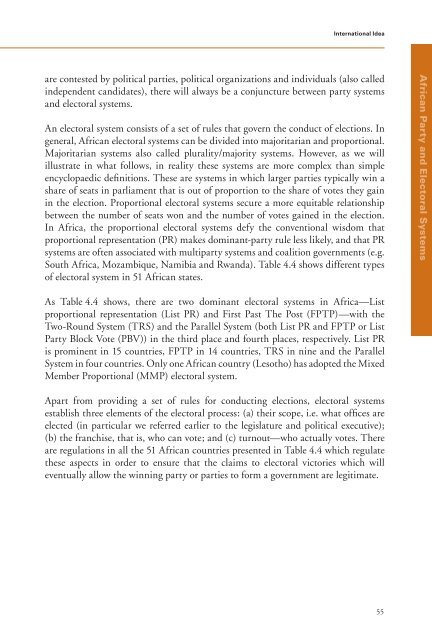Political Parties in Africa: Challenges for Sustained Multiparty
Political Parties in Africa: Challenges for Sustained Multiparty
Political Parties in Africa: Challenges for Sustained Multiparty
You also want an ePaper? Increase the reach of your titles
YUMPU automatically turns print PDFs into web optimized ePapers that Google loves.
International Idea<br />
are contested by political parties, political organizations and <strong>in</strong>dividuals (also called<br />
<strong>in</strong>dependent candidates), there will always be a conjuncture between party systems<br />
and electoral systems.<br />
An electoral system consists of a set of rules that govern the conduct of elections. In<br />
general, <strong>Africa</strong>n electoral systems can be divided <strong>in</strong>to majoritarian and proportional.<br />
Majoritarian systems also called plurality/majority systems. However, as we will<br />
illustrate <strong>in</strong> what follows, <strong>in</strong> reality these systems are more complex than simple<br />
encyclopaedic def<strong>in</strong>itions. These are systems <strong>in</strong> which larger parties typically w<strong>in</strong> a<br />
share of seats <strong>in</strong> parliament that is out of proportion to the share of votes they ga<strong>in</strong><br />
<strong>in</strong> the election. Proportional electoral systems secure a more equitable relationship<br />
between the number of seats won and the number of votes ga<strong>in</strong>ed <strong>in</strong> the election.<br />
In <strong>Africa</strong>, the proportional electoral systems defy the conventional wisdom that<br />
proportional representation (PR) makes dom<strong>in</strong>ant-party rule less likely, and that PR<br />
systems are often associated with multiparty systems and coalition governments (e.g.<br />
South <strong>Africa</strong>, Mozambique, Namibia and Rwanda). Table 4.4 shows different types<br />
of electoral system <strong>in</strong> 51 <strong>Africa</strong>n states.<br />
As Table 4.4 shows, there are two dom<strong>in</strong>ant electoral systems <strong>in</strong> <strong>Africa</strong>—List<br />
proportional representation (List PR) and First Past The Post (FPTP)—with the<br />
Two-Round System (TRS) and the Parallel System (both List PR and FPTP or List<br />
Party Block Vote (PBV)) <strong>in</strong> the third place and fourth places, respectively. List PR<br />
is prom<strong>in</strong>ent <strong>in</strong> 15 countries, FPTP <strong>in</strong> 14 countries, TRS <strong>in</strong> n<strong>in</strong>e and the Parallel<br />
System <strong>in</strong> four countries. Only one <strong>Africa</strong>n country (Lesotho) has adopted the Mixed<br />
Member Proportional (MMP) electoral system.<br />
Apart from provid<strong>in</strong>g a set of rules <strong>for</strong> conduct<strong>in</strong>g elections, electoral systems<br />
establish three elements of the electoral process: (a) their scope, i.e. what offices are<br />
elected (<strong>in</strong> particular we referred earlier to the legislature and political executive);<br />
(b) the franchise, that is, who can vote; and (c) turnout—who actually votes. There<br />
are regulations <strong>in</strong> all the 51 <strong>Africa</strong>n countries presented <strong>in</strong> Table 4.4 which regulate<br />
these aspects <strong>in</strong> order to ensure that the claims to electoral victories which will<br />
eventually allow the w<strong>in</strong>n<strong>in</strong>g party or parties to <strong>for</strong>m a government are legitimate.<br />
<strong>Africa</strong>n Party and Electoral Systems
















